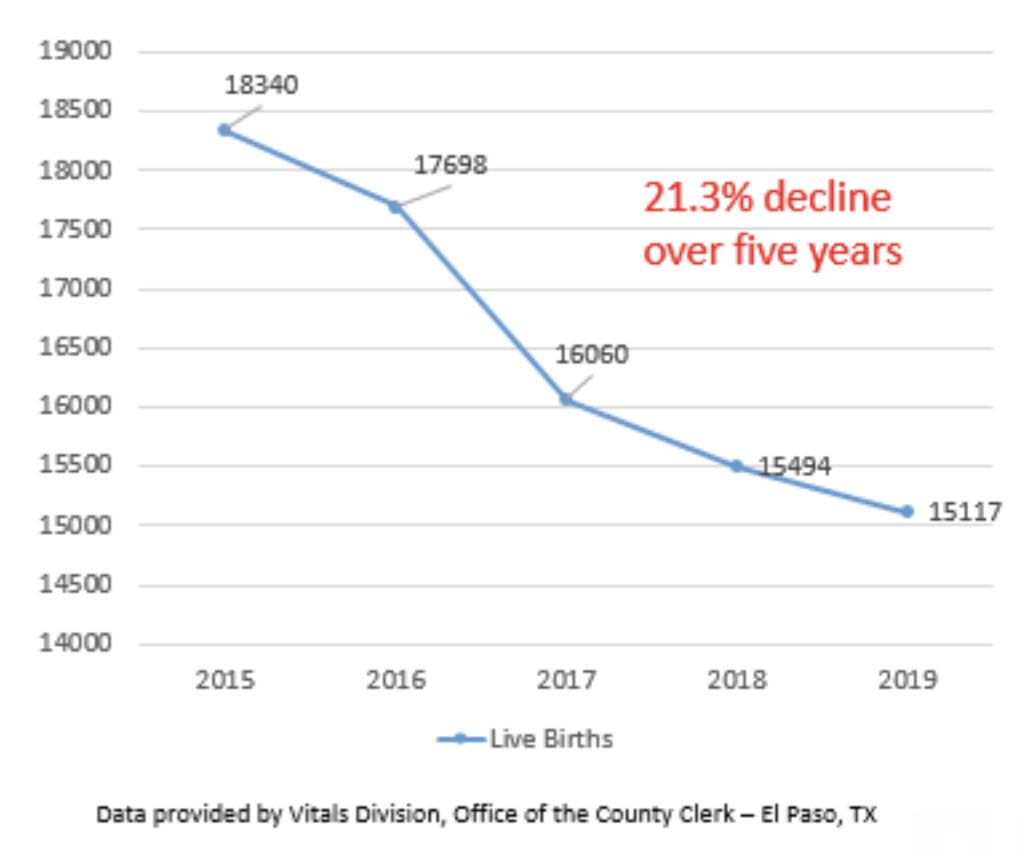UTEP expert says low fertility rates may correspond with high unemployment rates
EL PASO, Texas -- In the last five years, there has been a steep decline in birth rates in El Paso County, according to data Collected by the Vitals Division from the Office of the County Clerk.
The University Medical Center of El Paso supplied this graph below:

It's highlights a 21.3% decline in live births since 2015. The ABC-7 I-Team reached out to the Vital Division for the year to date total for 2020. El Paso hit 6,907 births as of July 20th. The county may not even hit 14,000 by year's end, if this pace continues.
"People's lives and livelihoods are at stake, as consequence fertility rates have declined quiet precipitously," UTEP Economics Professor Tom Fullerton said.
ABC-7 spoke with two expecting mothers. Trisha Easton, who is 28-weeks pregnant and Mercedes Espinoza, who is 37 weeks pregnant. Both telling our news team that this pregnancy has proven difficult during a pandemic.
Easton is carrying her first child. "I am due October 14, so it has been an entire pandemic pregnancy for me," she told our crew. Easton said her husband couldn't accompany her through some of the intimate medical appointments. "
"He is not allowed in my ultrasounds at all, even though we live together, even though he wears a mask," she said.
Espinoza echoed her sentiment adding, "One of the most challenging things is my doctor appointments." She talked about juggling schedules with her husband who works and finding someone to watch her two other children, since they can't come to the appointments.
Fullerton told ABC-7 this pandemic is weighing on everyone's mind and wallet, which is having adverse effects on pregnancies. ""People's lives and livelihoods are at stake, as consequence fertility rates have declined quite precipitously," he said.
Both expecting mothers say they thought about the cost of having a child before pregnancy.
"Before we got pregnant it was about affording a child and nursery items," Easton said.
Espinoza added, "We are managing away and budgeting."
Fullerton provided these statistics: "In 2019 the cost to raise a child up to the age of 18 was 233,610 that averages out to a little less that $13,000 a year. That is about a $1,000 a month per each child in a household."
He added, "When people are losing their jobs or having their hours at work cut back, adding a 1,000 dollars a month in new expenditures of any type is an economic decision that is going to be looked at very seriously."
Espinoza lived in a two-income household before the pandemic. She worked in social media marketing and cinematography to help support two kids with a third on the way.
"I freaked out myself when the film industry was put on halt because I was like that is my paycheck that is my source of income," Espinoza said. "I have to remember I have my husband who is here supporting me financially and and helping us get through this stuff and I am so thankful for that."
Easton, who works for KVIA and her husband who is in the military consider themselves fortunate during this time to be employed.
"We haven't lost our jobs and I am thankful because I know that's not the case for everyone," she said.